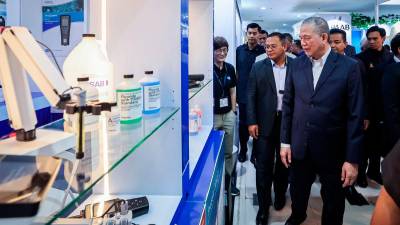KUALA LUMPUR: Malaysia must continue advancing the use of bio-based and plant-derived technologies as sustainable alternatives to conventional chemical treatments in water and wastewater management.
Deputy Prime Minister Datuk Seri Fadillah Yusof stated that such innovations reduce the nation’s carbon footprint and environmental impact while enhancing resource efficiency and national self-reliance.
He emphasised these efforts align with the National Energy Transition Roadmap to ensure water sustainability and environmental stewardship move forward in harmony.
Fadillah, who is also the Energy Transition and Water Transformation Minister, spoke while officiating the Malaysia International Water Convention 2025.
He stressed that as Malaysia progresses towards Water Sector Transformation 2040, bold steps must be taken to embrace emerging technologies and empower local innovators.
The Deputy Prime Minister asserted that Malaysia must not only adopt technologies from abroad but also create, refine, and export its own innovations globally.
He highlighted the importance of cultivating a vibrant ecosystem of home-grown startups, researchers, and entrepreneurs to build local intellectual property.
Fadillah also launched the NextWave Innovation initiative and the Young Water Professional Mentor-Mentee programme during the event.
He described the convention as a catalyst for transformation that unites government, industry, academia, and innovators to harness water’s full potential.
A key highlight is the Non-Revenue Water Workshop focusing on efficiency improvement, resource conservation, and long-term sustainability.
Fadillah noted that through smart metering, leak detection, and data-driven monitoring, Malaysia is taking bold steps to align with global sustainability goals.
He elaborated that the NextWave Innovation initiative bridges the gap between research and application through collaboration between PROTEMP and Universiti Teknologi Malaysia.
These partnerships represent the collaborative DNA that Malaysia must continue to strengthen for real-world impact.
Fadillah announced Malaysia envisions establishing a National Water Hub by 2040 in alignment with the AIR2040 aspirations.
This hub will serve as the nerve centre of the nation’s water ecosystem, connecting research, innovation, policy, and industry under one dynamic framework.
He concluded that the mission of sustainable water management requires collective responsibility from policymakers, industry players, researchers, and communities. – Bernama
